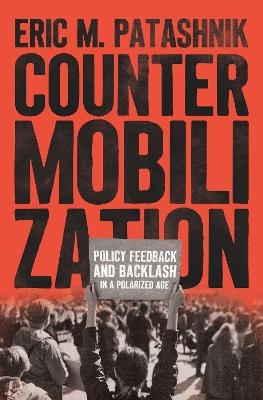
Countermobilization
Policy Feedback and Backlash in a Polarized Age
Seiten
2024
University of Chicago Press (Verlag)
978-0-226-82987-6 (ISBN)
University of Chicago Press (Verlag)
978-0-226-82987-6 (ISBN)
An essential look at how and why backlash movements are inherent to US policymaking.
The most successful policies not only solve problems. They also build supportive coalitions. Yet, sometimes, policies trigger backlash and mobilize opposition. Although backlash is not a new phenomenon, today’s political landscape is distinguished by the frequency and pervasiveness of backlash in nearly every area of US policymaking, from abortion rights to the Affordable Care Act.
Eric M. Patashnik develops a policy-centered theory of backlash that illuminates how policies stimulate backlashes by imposing losses, overreaching, or challenging existing arrangements to which people are strongly attached. Drawing on case studies of issues from immigration and trade to healthcare and gun control, Countermobilization shows that backlash politics is fueled by polarization, cultural shifts, and negative feedback from the activist government itself. It also offers crucial insights to help identify and navigate backlash risks.
The most successful policies not only solve problems. They also build supportive coalitions. Yet, sometimes, policies trigger backlash and mobilize opposition. Although backlash is not a new phenomenon, today’s political landscape is distinguished by the frequency and pervasiveness of backlash in nearly every area of US policymaking, from abortion rights to the Affordable Care Act.
Eric M. Patashnik develops a policy-centered theory of backlash that illuminates how policies stimulate backlashes by imposing losses, overreaching, or challenging existing arrangements to which people are strongly attached. Drawing on case studies of issues from immigration and trade to healthcare and gun control, Countermobilization shows that backlash politics is fueled by polarization, cultural shifts, and negative feedback from the activist government itself. It also offers crucial insights to help identify and navigate backlash risks.
Eric M. Patashnik is professor of public policy and political science at Brown University. His books include Reforms at Risk: What Happens After Major Policy Changes Are Enacted.
List of Figures and Tables
Introduction
Chapter 1: Understanding Policy Backlash
Chapter 2: An Overview of Backlash Politics
Chapter 3: First Do No (Political) Harm: Backlash Forces in U.S. Health Policymaking
Chapter 4: Trade, Immigration, and the Antiglobalization Backlash
Chapter 5: Backlash at the Grassroots: Segregated Private Schools, Gun Control, and Transgender Rights
Chapter 6: Where’s the Backlash? The Air Traffic Controllers, the S&L Crisis, and Benefits for Drug Felons
Conclusion
Acknowledgments
Notes
References
Index
| Erscheinungsdatum | 16.12.2023 |
|---|---|
| Reihe/Serie | Chicago Studies in American Politics |
| Zusatzinfo | 25 line drawings, 19 tables |
| Sprache | englisch |
| Maße | 152 x 229 mm |
| Gewicht | 513 g |
| Themenwelt | Sozialwissenschaften ► Politik / Verwaltung ► Politische Systeme |
| Sozialwissenschaften ► Politik / Verwaltung ► Politische Theorie | |
| Sozialwissenschaften ► Politik / Verwaltung ► Staat / Verwaltung | |
| ISBN-10 | 0-226-82987-1 / 0226829871 |
| ISBN-13 | 978-0-226-82987-6 / 9780226829876 |
| Zustand | Neuware |
| Informationen gemäß Produktsicherheitsverordnung (GPSR) | |
| Haben Sie eine Frage zum Produkt? |
Mehr entdecken
aus dem Bereich
aus dem Bereich
eine Einführung
Buch | Softcover (2023)
Springer VS (Verlag)
CHF 55,95


